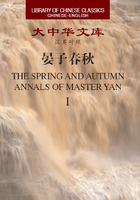
2.17 [42] 景公朝居严下不言晏子谏
齐景公在朝堂上太严厉臣下们不敢说话,晏子进谏
【原文】
晏子朝,复于景公曰:“朝居严乎?”公曰:“(严居朝)〔朝居严〕,则(害曷)〔曷害〕于治国家哉?”晏子对曰:“朝居严则下无言,下无言则上无闻矣。下无言,则(无)〔吾〕谓之喑,上无闻,则吾谓之聋。聋喑,非害国家而如何也!且合升(豉)〔㪷〕之微以满仓廪,合疏缕之纬以成帏幕,太山之高,非一石也,累卑然后高〔也〕。夫〔治天〕下者,非用一士之言也,固有受而不用,恶有拒而不受者哉?”
【今译】
2.17 [42] DUKE JING ACTED STERNLY DURING AN AUDIENCE AND HIS INFERIORS DID NOT SPEAK OUT. YANZI REMONSTRATED.[1]
During a court audience,Yanzi addressed Duke Jing,saying:[2] “Should one act sternly during an audience?”
The Duke said: “If one is stern during an audience,what harm is done to the good governance of the state?”
Yanzi answered: “If an audience is conducted sternly,then inferiors w ill say nothing and superiors w ill heed nothing. When inferiors say nothing,I call this ‘muteness’; when superiors heed nothing,I call this ‘deafness.’ If deafness and muteness do not constitute a danger to the state,what does? Furthermore,by accumulating grain in minute quantities of sheng and dou,[3] one can fill the public granaries; by collecting loose threads,one can form a curtain. The height of M t. Tai was not made of a single rock; low layers were piled up until it became high. As for those who govern the realm,they do not rule by using the words of just one officer. Surely,there are cases of receiving w ithout employing; but how could there be cases of rejecting without receiving?”
注释
[1]Item 2.17 [42] ↔ Shuoyuan,9.26/76/13.
[2]Om it 朝 following the Shuoyuan version.
[3]A sheng 升 was 199.7 cubic centimeters. Ten sheng made one dou 斗.